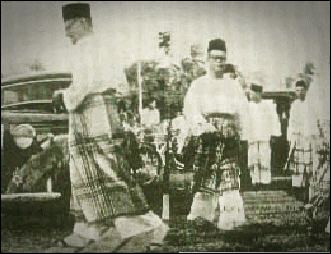Are we 'buta sejarah'?
Dato' Dzulkifli Abd Razak
Article
- Comment- New Sunday Times - 03/05/2006
Documentaries need to be made on the nation’s great leaders. Students need to be more informed about their culture and history of the nation.
MALAYSIAN artistes are going places these days. The multi-talented Maya Karin will be off to Hollywood to attend the 78th Academy Award ceremony.
Although she will be there in her capacity as Channel [V] host to tape the pre-Oscar show and do interviews, it is a start.
Overall, the entertainment industry in Malaysia is poised for better times.
The Mawi-mania is hardly over and it seems we will be hit by another wave of young talents. Given the aggressive support from the mobile phone industry, many more will be hooked to the small screen ready to deliver the votes.
No doubt this is all good economics for the local entertainment industry and the telcos. But is that all?

Last week, we honoured one of Malaysia's true heroes,
Datu Onn Jaafar (right). Does he not deserve a world-class
documentary film?
What can we say about their contribution to the agenda of nation-building, say, the much talked about issues of perpaduan (unity), knowledge-society or even that of Islam Hadhari?
How effectively has this been "exploited" in building bridges among Malaysians? Is the combination of Jac and Daniel of the Malaysian Idol series and Mawi — who together coincidentally represent the three major ethnic groups in Malaysia — making significant headway?
Prof Emeritus Khoo Khay Kim recently mentioned the importance of "cultural history" as a step to building bridges among Malaysians. This is a credible and timely suggestion but it need not be confinedto a formal academic setting.
Here is where the entertainment industry has a major role to play in advancing the cultural history of the country in the most creative and effective way. Unfortunately, this is not done nearly enough.
If at all, it is often presented in a very dull fashion, at least when compared to the recent documentary on the 600th anniversary of the voyage of Zheng He, the Muslim admiral of Imperial China, or those on Alexander and Ghengis Khan.
Not only were these illuminating, they were equally entertaining and enriching with respect to the cultural history of those times. In fact, this is a better way to introduce the subject without turning it into an examinable subject taught only in schools and universities.
Last week, we honoured one of Malaysia’s true heroes, Datuk Onn Jaafar. Does he not deserve a world-class documentary film? We have capable actors, scriptwriters, producers, directors, researchers and historians for this.
The need to protect our culture was raised more than three decades ago by Prof Ungku Aziz at a 1971 regional seminar on Role of Universities in National Development Planning in Southeast Asia.
He wrote: "In the search for material progress, unless there is a counterbalance on the cultural side of national life, ultimately the newly found material enjoyment will become like tasteless fruits and aromaless (sic) flowers."
Ungku Aziz went on to suggest the importance of consciousness about aesthetics and appreciation of fine arts, including literature, drama, dance and music.
He was in fact categorical when he said: "One thing is fairly likely to be clear. Many will have little capacity to enjoy his national heritage of poetry, literature and drama."
It looks like we have come full circle. At one point, Khoo aptly described the situation as buta sejarah (historically illiterate).
Thus, it is important to articulate the issue now, not only because the entertainment- cum-media world has become very pervasive and dominant, but because we can no longer afford the kind of entertainment that offers little relevance to the advancement of cultural education and history.
